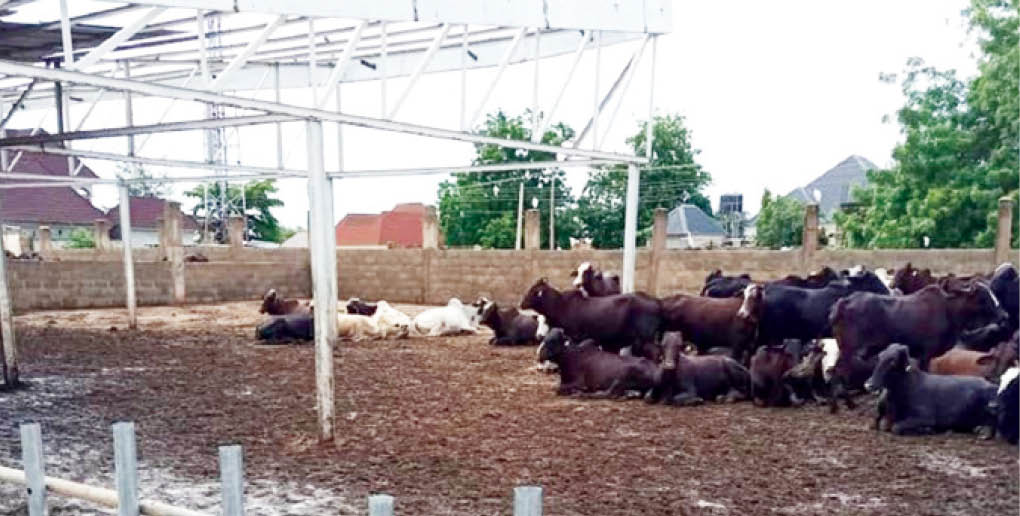Well known for its red goat and cow species, Sokoto State has taken a step further to capitalise on its livestock culture to modernise and revolutionise the animal husbandry system in the state.
At the heat of the farmers-herders crisis across the country, the state decided to revive its abandoned cattle breeding programme by importing about 117 cattle, consisting of Jersey, Brangus and Holtsien and Jersey crossbreeds.
At the farms, most of the female animals have calves and the 13 cluster farmers that benefited from the state’s interventions are recording increase in milk, up from the 1 to 3 litres produced by local breeds of cattle to about 10 to 30 litres per hybrid cow daily.
The state also has the breed for meat, which is expected to weigh up to 500kg or more as against 100 to 250 kg. This will bring more income to the farmers and generate more interest from many others.
The pasture development component in Dogon Daji, which is over 1000 hectares, has been developed and harvesting has started there. Also, there is the 5000 hectares in Rabah local government.
These are in addition to 19 grazing reserves with over 20,000 hectares for pasture development. The government is also going into ranching in the three senatorial districts on at least 50,000 hectares amounting to a total of 150,000 hectares.
Professor Abdulkadir Usman Junaidu, who explained the initiatives to Daily Trust, said “For the first time in the world, we were able to produce the first cross-breed of Brangus and Sokoto Gudali breed of cattle.

“We were also able to cross-breed Jersey and Sokoto Gudali which will improve both meat and milk production in the state.”
Prof Junaidu, who heads the Ministry of Animal Health and Fisheries Development, said they will cover the 23 local governments of the state with the animal artificial insemination and embryo transfer programme.
“We are able to procure semen and embryo; we have commenced artificial insemination and embryo transplant across the 23 local governments. We have covered two-thirds of the state and we are continuing.
“The essence is that we are aware our farmers cannot purchase these exotic breeds because of their high cost, so we bring in the semen and embryo for insemination of the animal. The semen and embryos are brought in from the US.
“The essence is to ensure that we improve the genetic potential of our local breed to be able to produce more milk and meat.
“We are also procuring 500 exotic breeds of animals for distribution to farmers from South Africa. We have also purchased state of the art mobile laboratory vehicle,” he said.
There has been an increase in milk production and many of the farmers in some of these farms have created mini dairy farms because the government does not only give them the animals, but also facilities for dairy production.
They enjoy facilities such as standby generators and housing for the animals while two veterinary doctors are each attached to dairy farms for consistent monitoring of the animals’ health.
To sustain the artificial insemination and embryo transplant programme, the state has invested in liquid nitrogen production.
“To have effective artificial insemination and embryo transplant, you need to maintain them with liquid nitrogen. We have a factory that produces liquid nitrogen. We produce about 40 to 45 litres a day, each litre costs N2000.
“We plan to go into commercial production. For now, we are only maintaining our semen and embryo,” he said.
On dairy production, he said the state has revived its comatose dairy plant which has started producing milk collected from the cluster farms. It has the capacity to process 5000 litres of milk per day.
To cater for the health of the animals, the state veterinary clinics are to provide services to farmers across the state.
According to the officer in charge of the Veterinary Clinic Sokoto, Dr. Lawal Bello Yahaya, 16 solar panels were installed with two 2.3KVA inverters and eight 220AH batteries to ensure regular power supply.
With the provision of borehole and installation of solar panels, the clinic will enjoy 24hrs water and power supply, he stated.
Dr. Umar Musa Gwadabawa, one of the managers of the programme, said electricity is important in carrying out reliable and rapid diagnostic testing to help contain medical emergencies, adding that “even the most routine procedures require medical tools like ultrasound and X-ray machines that are impossible to use without reliable power source.”
Similarly, water plays an important role in the health care field; from washing surgical tools and equipment to creating a soothing environment for patients, doctors and staff. In short, water is essential to the effectiveness of the health industry.
To solve farmers-pastoralists clashes, the state has gazetted 10 out of its 19 grazing reserves and so far has demarcated more than 400 kilometres of the grazing reserves to prevent encroachment.
This is followed with the planting of pasture and provision of water in the grazing reserves so that pastoralists don’t have to move anywhere outside the state.
With the massive investment in livestock in the state, Sokoto provides a model for other northern states toward addressing the deadly clashes by players in the sector and ultimately to modernise it.
Alhaji Mahmood Sidi, a manager at Sidi Akibu Dairy Farms Limited located at plot 21-26 Gusau Road Sokoto is one of the 13 Cluster farmers that received six pregnant exotic heifers(Jersey Breed) with three male bulls under Gov Aminu Waziri Tambuwal livestock programme.
“Our farm achieved a lot of development through these cows because base on our record we are getting 5800 litres of milk from each cow during her lactation period in a year.
“And their lactation period is 310 days in a year. After the end of this lactation period, the cow will rest for two to three weeks without milking her. She will stay dry for that period till after delivery before We start milking her again.
“We are selling a litre of milk at N300, when you multiply N300 by 5800 litres of milk you have N1,740,000 in a year per cow,” he said.
As for the male bulls, he separated them in three pen with about eighty heads of cattle in each pen that the bull is serving whenever they are on heat.
“We derived many offspring from these bulls that people are coming from neighboring states to purchase this type of breed from us.
The price of offspring is N950,000 per one when it is female but for male it depends on the size but the price starts from N400,000 and above,” Mohamood said.

 Join Daily Trust WhatsApp Community For Quick Access To News and Happenings Around You.
Join Daily Trust WhatsApp Community For Quick Access To News and Happenings Around You.


